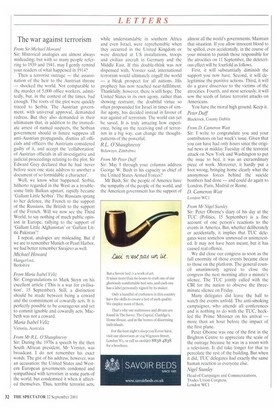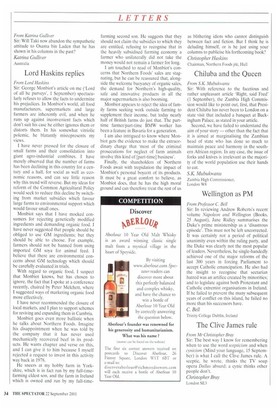The war against terrorism
From Sir Michael Howard Sir: Historical analogies are almost always misleading: but with so many people referring to 1939 and 1941, may I gently remind your readers of what happened in 1914?
Then a terrorist outrage — the assassination of the heir to the Austrian throne — shocked the world. Not comparable to the murder of 5,000 office workers, admittedly, but, in the context of the times, bad enough. The roots of the plot were quickly traced to Serbia. The Austrian government, with universal approval, demanded redress. But they also demanded in their ultimatum that, in addition to the immediate arrest of named suspects, the Serbian government should in future suppress all anti-Austrian propaganda, dismiss all officials and officers the Austrians considered guilty of it, and accept the 'collaboration' of Austrian officials in all investigative and judicial proceedings relating to the plot. Sir Edward Grey declared that he had 'never before seen one state address to another a document of so formidable a character'.
Well, we know what happened. Serbia, hitherto regarded in the West as a troublesome little Balkan upstart, rapidly became 'Gallant Little Serbia'. The Russians sprang to her defence, the French to the support of the Russians, the British to the support of the French. Will we now see the Third World, to say nothing of much public opinion in Europe, rallying to the support of 'Gallant Little Afghanistan' or 'Gallant Little Pakistan'?
I repeat, analogies are misleading. But if we are to remember Munich or Pearl Harbor, we had better remember Sarajevo as well. Michael Howard
Hungerford, Berkshire
From Maria Isabel Veliz Sir: Congratulations to Mark Steyn on his excellent article (`This is a war for civilisation', 15 September). Still, a distinction should be made between being a coward and the commitment of cowardly acts. It is perfectly possible to be courageous and yet to commit ignoble and cowardly acts. Macbeth was not a coward.
Maria Isabel Veliz
Victoria, Australia
From Mr R. L. O'Shaughnessy Sir: During the 1970s a speech by the then South African president, Mr Vorster, was broadcast. I do not remember his exact words. The gist of his address, however, was an accusation: the United States and Western European governments condoned and sympathised with terrorism in some parts of the world, but condemned it when it affected themselves, Thus, terrible terrorist acts, while understandable in southern Africa and even Israel, were reprehensible when they occurred in the United Kingdom or were directed at US installations, troops and civilian aircraft in Germany and the Middle East. If this double-think was not dispensed with, Vorster said, international terrorism would ultimately engulf the world — a bleak prospect for all nations. His prophecy has now reached near-fulfilment. Thankfully, however, there is still hope. The United States in its own agony, rather than showing restraint, the doubtful virtue so often propounded for Israel in times of similar agony, has decided instead in favour of war against all terrorism. The world can yet be saved. It is truly amazing how experience, being on the receiving end of terrorism in a big way, can change the thoughtpatterns of the powerful.
R.L. O'Shaughnessy
Bulawayo, Zimbabwe
From Mr Peter Duff Sir: May 1 through your columns address George W. Bush in his capacity as chief of the United States Armed Forces?
Mr Bush, Sir: the people of America have the sympathy of the people of the world, and the American government has the support of almost all the world's governments. Maintain that situation. If you allow innocent blood to be spilled, even accidentally, in the course of your mission to punish those responsible for the atrocities on 11 September, the deleterious effect will be fourfold as follows.
First, it will substantially diminish the support you now have. Second, it will delegitimise the punitive actions. Third, it will do a grave disservice to the victims of the atrocities. Fourth, and most seriously, it will sow the seeds of future terrorist attacks on Americans.
You have the moral high ground. Keep it.
Peter Duff
Blackrock, County Dublin
From D. Cameron Watt Sir: 1 write to congratulate you and your contributors on last week's issue. Given that you can have had only hours since the original news at midday Tuesday of the terrorist attack on New York and Washington to put the issue to bed, it was an extraordinary piece of work. Moreover, it hardly put a foot wrong, bringing home clearly what the anonymous forces behind the suicide bombers had done — and could do again to London. Paris, Madrid or Rome.
D. Cameron Watt
London WC1
From Mr Nigel Stanley Sir: Peter Oborne's diary of his day at the TUC (Politics, 15 September) is a tine account of one person's reactions to the events in America. But, whether deliberately or accidentally, it implies that TUC delegates were somehow unmoved or uninterested. It may not have been meant, but it has caused real offence.
We did close our congress as soon as the full enormity of those events became clear to those on the platform. The general council unanimously agreed to close the congress the next morning after a minute's silence. The TUC jointly called with the CBI for the nation to observe the threeminute silence on Friday.
Many delegates did leave the hall to watch the events unfold. The anti-smoking campaigner, who attends all conferences and is nothing to do with the TUC, heckled the Prime Minister on his arrival — more than an hour before the impact of the first plane.
Peter Oborne was one of the first in the Brighton Centre to appreciate the scale of the outrage because he was in a room with a television. It did take longer for that to percolate the rest of the building. But when it did, TUC delegates had exactly the same human reaction as everyone else.
Nigel Stanley
Head of Campaigns and Communications, Trades Union Congress. London WC1
From Katrina Gulliver Sir: Will Taki now abandon the sympathetic attitude to Osama bin Laden that he has shown in his columns in the past?
Katrina Gulliver
Australia











































































 Previous page
Previous page